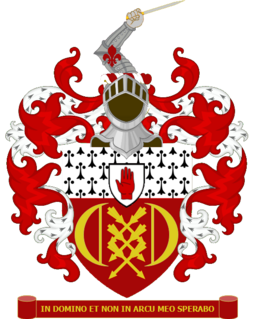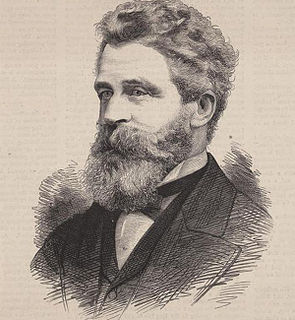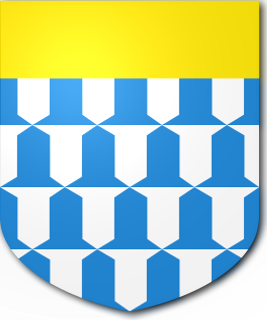The Outram of Bengal baronetcy is a title in the Baronetage of the United Kingdom. It was created on 10 November 1858 for General Sir James Outram. He was the son of the civil engineer Benjamin Outram. The family surname is pronounced "Ootram".

The Outram of Bengal baronetcy is a title in the Baronetage of the United Kingdom. It was created on 10 November 1858 for General Sir James Outram. He was the son of the civil engineer Benjamin Outram. The family surname is pronounced "Ootram".


The heir apparent to the baronetcy is Douglas Benjamin James Outram (born 1979), only son of the 5th Baronet.

Baron St Levan, of St Michael's Mount in the County of Cornwall, is a title in the Peerage of the United Kingdom. It was created on 4 July 1887 for the former Member of Parliament Sir John St Aubyn, 2nd Baronet, becoming John St Aubyn, 1st Baron St Levan. He had previously represented Cornwall West in House of Commons as a Liberal and St Ives as a Liberal Unionist. He was succeeded by his eldest son, the second Baron, who was a Colonel and Honorary Brigadier-General in the Grenadier Guards. On his death the titles passed to his nephew, the third Baron, the son of the Hon. Sir Arthur James Dudley Stuart St Aubyn (1867–1897), second son of the first Baron. The third baron was succeeded in 1978 by his eldest son, the fourth baron, who had served with the Royal Navy at Dunkirk and in a minesweeper in Arctic Convoys during World War II and was awarded the Distinguished Service Cross (DSC). As of 2014, the titles are held by the fourth Baron's nephew, the fifth Baron, who succeeded in 2013.
There have been six Baronetcies created for persons with the surname Brown, one in the Baronetage of Nova Scotia, one in the Baronetage of England, two in the Baronetage of Great Britain and two in the Baronetage of the United Kingdom. Two creations are extant as of 2010.

There have been twelve baronetcies created for people with the surname Scott, one in the Baronetage of England, two in the Baronetage of Nova Scotia, and nine in the Baronetage of the United Kingdom.
There have been four baronetcies for persons with the surname Blake, one in the Baronetage of Ireland, two in the Baronetage of Great Britain and one in the Baronetage of the United Kingdom. Two of the creations are extant as of 2010. The Blake Baronetcy, of Menlough in the County of Galway, was created in the Baronetage of Ireland on 10 July 1622 for Valentine Blake, Mayor of Galway in 1611 and 1630 and a member of the Irish House of Commons for Galway. His grandfather Thomas Blake had preceded him as Mayor. The second Baronet was a member of the Irish Parliament for Galway Borough. The third Baronet represented both County Galway and Galway Borough in Parliament. The sixth Baronet was a member of the Irish House of Commons for County Galway. He was the first Catholic gentlemen of distinction to join William of Orange. The twelfth Baronet represented Galway Borough in the British House of Commons. The fourteenth Baronet was high sheriff of County Galway in 1872. See also the Blake Baronetcy of Twizell Castle below.

There have been three baronetcies created for members of the Ingilby/Ingleby family, one in the Baronetage of England, one in the Baronetage of Great Britain and one in the Baronetage of the United Kingdom. The latter title is extant while the other two creations are extinct.
There have been five Baronetcies created for people with the surname Forbes, four in the Baronetage of Nova Scotia and one in the Baronetage of the United Kingdom. The first holder of the Burn Baronetcy of Jessfield, created in the Baronetage of the United Kingdom in 1923, assumed the surname of Forbes-Leith of Fyvie in 1925.

There have been four baronetcies created for persons with the surname Sykes, two in the Baronetage of Great Britain and two in the Baronetage of the United Kingdom. Three of the creations are extant as of 2008.
There have been three baronetcies created for persons with the surname Kinloch, two in the Baronetage of Nova Scotia and one in the Baronetage of the United Kingdom. Two of the creations are extant as of 2010.

There have been three baronetcies created for persons with the surname Chapman, one in the Baronetage of Great Britain, one in the Baronetage of Ireland and one in the Baronetage of the United Kingdom. Two of the creations are extinct while one is extant.

The Molony Baronetcy, of the City of Dublin, is a title in the Baronetage of the United Kingdom. It was created on 21 January 1925 for Thomas Molony, the former Lord Chief Justice of Ireland.

There have been three baronetcies created for members of the Blakiston family of Blakiston, County Durham, two in the Baronetage of England and one in the Baronetage of Great Britain. One creation is extant as of 2008.

The Blennerhassett Baronetcy of Blennerville in the County of Kerry, is a title in the Baronetage of the United Kingdom. It was created on 22 September 1809 for Rowland Blennerhassett, the member of a family that was originally settled in Cumberland, England, and subsequently at Frenze, Norfolk, and Barsham, Suffolk. Members of the Blennerhassett family represented Carlisle in almost every Parliament from the reign of Richard II to the reign of James I. This branch of the family settled in County Kerry during the reign of James I and its members frequently represented County Kerry and Tralee in the Irish House of Commons. The first Baronet's son, the second Baronet, was High Sheriff of Kerry in 1823. He was succeeded by his son, the third Baronet. He served as High Sheriff of County Kerry in 1820. His son, the fourth Baronet, was a Liberal politician.

There have been two baronetcies created for members of the Peto family, both in the Baronetage of the United Kingdom. As of 2014 both creations are extant.
There have been four baronetcies created for persons with the surname Hall, one in the Baronetage of Nova Scotia and three in the Baronetage of the United Kingdom. Three of the creations are extant as of 2010.

There have been nine baronetcies created for persons with the surname Cooper, one in the Baronetage of England, one in the Baronetage of Ireland and seven in the Baronetage of the United Kingdom.
There have been six baronetcies created for persons with the surname Thomas, three in the Baronetage of England, one in the Baronetage of Great Britain and two in the Baronetage of the United Kingdom. Two of the creations are extant as of 2016.
There have been two baronetcies created for persons with the surname Sullivan, both in the Baronetage of the United Kingdom. One creation is extant as of 2010.
There have been seven baronetcies created for persons with the surname Sinclair, six in the Baronetage of Nova Scotia and one in the Baronetage of Great Britain. Four of the creations are extant as of 2008.
There have been six baronetcies created for persons with the surname Price, one each in the baronetages of England and of Great Britain and four in the baronetage of the United Kingdom. Two of the creations were extant as of 2008.

There have been two baronetcies created for persons with the surname Tichborne, both in the Baronetage of England. Both creations are extinct.